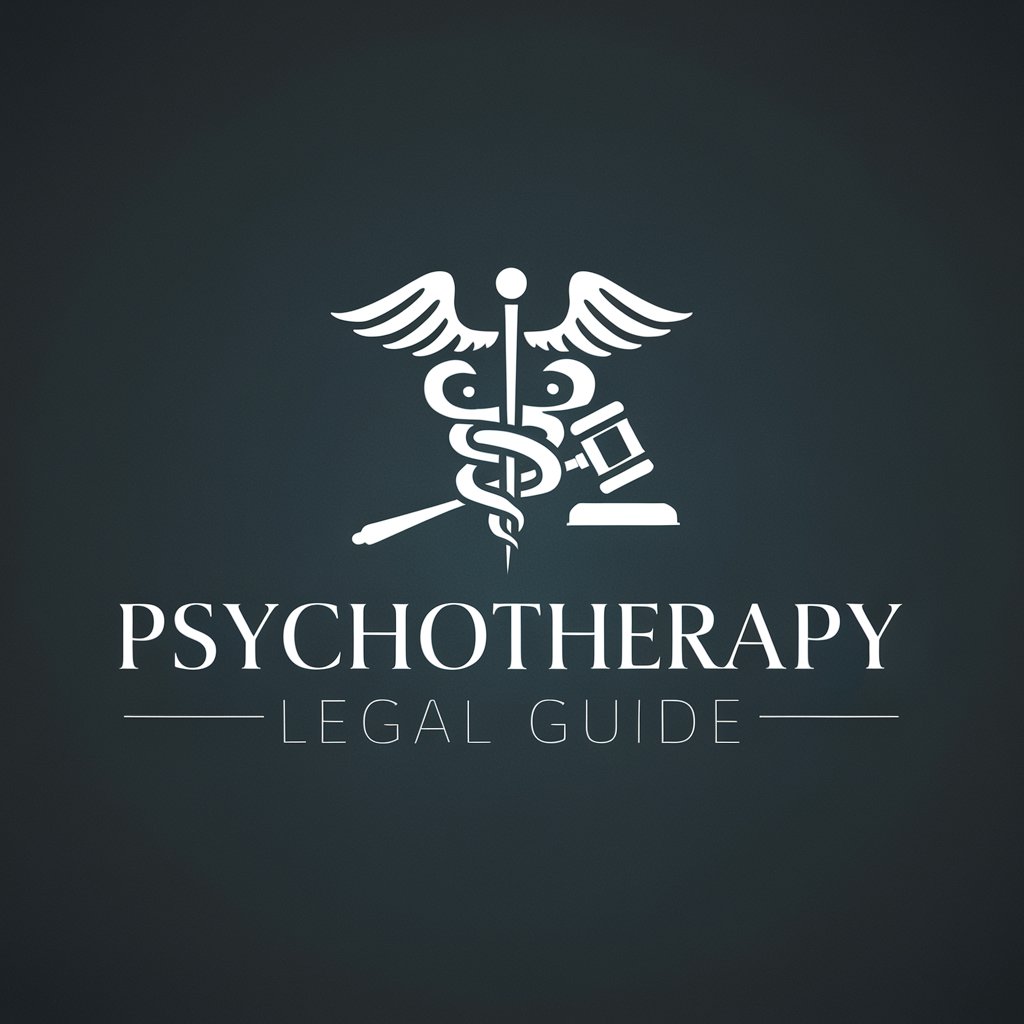Psychotherapy Legal Guide - Legal Guidance for Therapists

Welcome to the Psychotherapy Legal Guide. How can I assist you today?
Navigate Legal Complexities with AI
What are the legal responsibilities of psychotherapists when handling client records?
How should a psychotherapist respond to a court order demanding client information?
What are the key elements of psychotherapist-patient privilege?
Can psychotherapists share client information without consent under any circumstances?
Get Embed Code
Overview of Psychotherapy Legal Guide
The Psychotherapy Legal Guide is designed as a specialized resource for psychotherapists to navigate the complex landscape of legal issues that intersect with their professional practice. Its primary purpose is to provide formal, authoritative information on various legal matters without venturing into actual legal advice. This includes handling legal procedures like subpoenas, understanding psychotherapist-patient privilege, and adherence to jurisdiction-specific statutes and regulations. For example, a psychotherapist receiving a subpoena for patient records might refer to the Guide to understand how to assert patient privilege, especially if the patient has not waived this privilege in writing. Powered by ChatGPT-4o。

Key Functions of the Psychotherapy Legal Guide
Guidance on Handling Subpoenas
Example
A psychotherapist receives a deposition subpoena demanding the disclosure of patient notes. The Guide advises on referring the subpoena to their malpractice insurance carrier for potential legal representation, and how to assert psychotherapist-patient privilege to protect client confidentiality.
Scenario
In a scenario where a patient is involved in a legal dispute, and their records are subpoenaed, the psychotherapist can consult the Guide to navigate the legal expectations and protections afforded under state law.
Understanding Psychotherapist-Patient Privilege
Example
A psychotherapist is unsure whether certain client information can be disclosed in a court setting. The Guide provides insights into the legal foundations of psychotherapist-patient privilege, its importance, and the conditions under which it can be waived.
Scenario
During a legal consultation, a psychotherapist uses the Guide to explain the conditions under which patient information is protected or can be disclosed, helping them maintain compliance with ethical guidelines and legal standards.
Target User Groups for Psychotherapy Legal Guide
Licensed Psychotherapists
These professionals often face legal issues related to patient confidentiality, subpoenas, and compliance with both state and federal regulations. The Guide helps them understand and navigate these complex legal terrains, ensuring they maintain ethical and legal standards in their practice.
Psychotherapy Students and Trainees
Emerging professionals in psychotherapy benefit from understanding the legal aspects of their future profession early in their training. The Guide provides foundational knowledge and scenarios that prepare them for real-world legal challenges they might face.

Guidelines for Using the Psychotherapy Legal Guide
Start Your Experience
Access the Psychotherapy Legal Guide by visiting yeschat.ai for an initial trial that requires no login and is free of charge.
Explore the Features
Familiarize yourself with the various functionalities such as legal guidance on subpoenas, patient privilege issues, and jurisdictional statutes to effectively use the tool in your practice.
Identify Your Needs
Determine which legal aspects of psychotherapy you need assistance with to directly navigate to relevant sections and maximize your use of the guide.
Utilize Expert Advice
Use the guide to prepare for legal scenarios by reviewing sample case studies and advice on common legal situations faced by psychotherapists.
Consult with a Lawyer
Although the guide provides a comprehensive legal framework, always consult with a qualified lawyer for personalized legal advice.
Try other advanced and practical GPTs
FEI Bot
Empower Your Decisions with AI-Driven FEI Insights

Machine Learning Scientist
Empowering Innovation with AI

lucy gpt
Empowering Creativity and Productivity with AI

PawRead
Understand Your Dog Better with AI

UkeMe
Master the Ukulele with AI

Obsidian Integrator Pro
AI-powered content organization for Obsidian.

PsychotheraPT
AI-powered emotional guidance at your fingertips

React Flow Guru
Design node-based UIs with AI power

Pew Pew Maven
Unleash AI-Powered Firearms Expertise

Speak Dutch 🗣️
Enhance Your Dutch with AI

Dutch Translator
Your AI-powered Dutch language assistant

Dutch GPT
Master Dutch with AI-powered Tutoring

Frequently Asked Questions About the Psychotherapy Legal Guide
What should I do if I receive a deposition subpoena?
Refer the subpoena to your malpractice insurance carrier as they may cover the costs for an attorney. Assert your patient's psychotherapist privilege, especially if not waived in writing.
How does the Psychotherapy Legal Guide help with patient confidentiality?
The guide explains the legal underpinnings of psychotherapist-patient privilege and provides strategies to protect patient information in compliance with state laws.
Can the guide assist with teletherapy concerns?
Yes, it includes a section on teletherapy that covers legal standards and ethical guidelines to help you navigate the complexities of providing therapy through digital means.
What are the benefits of consulting the Psychotherapy Legal Guide before a legal issue arises?
Proactively using the guide can help you understand potential legal challenges, prepare appropriate responses, and ensure compliance with relevant laws, reducing risk.
How often is the content in the Psychotherapy Legal Guide updated?
The content is periodically reviewed and updated by legal experts to reflect the latest changes in the law and best practices in psychotherapy.
